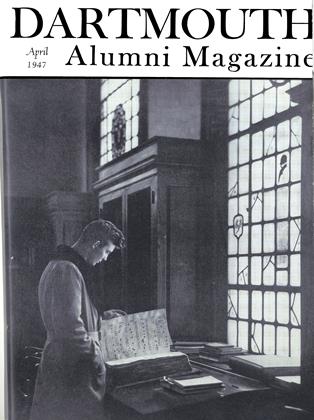For Those Who Want ToWrite, by Sidney Cox, Alfred A. Knopf, 1947, PP. 139, $2.00
I had not thought of my grandmother in years but she came to mind the other day when I finished Sidney Cox's new book. Until she did, I had been strongly tempted to avoid the difficulty of grappling with the Cox philosophy which is no heavy pedantry but is always present, as hard to pin down as poetry itself. It is easy enough to point out that Mr. Cox is an exciting teacher of writing, that he has been for a long while one of the two or three strongest influences on the Dartmouth faculty, and that he has managed to get most of himself into his book.
This is about all we could ask for and it is possible to back it up with suitable testimony remembered from conversations with every good Dartmouth writer I know. But Mr. Cox's book has another quality of good poetry in that it stirs up a great many ghosts and the thought of Grandmother would not down.
The fact is that Indirections is not only a book on writing, but is Sidney Cox's directions for living, and fair enough because he knows that writers are first of all people. In the process of digging into people, he defines a great man, and I think we may take it as his peroration. He says that the great men are those who are sensitive enough to see and know both sides of the conflicts which make up living, and who do not choose either side but instead "compose" or "fuse" them. He illustrates. He says that the great, when confronted with a choice between "right" and "left" (the political connotations are intended), choose neither one but grab both. In other words, Mr. Cox says that the great never take a side and remorselessly ride it home, and incidentally he says so with some feeling. This fascinates me, because it was at this very point that the ghost of Grandmother rose.
Grandmother was a side-taker and a believer. She believed that strong drink was a vice and she used to prove it by swooping upon the town o£ Emporia at the head of other believers and harrying the peaceable proprietors of saloons, yelling at them and heaving bricks through their plate glass. She was not sensitive. She would have shown a sharp tongue to anyone who suggested, as Mr. Cox suggests in the course of the above mentioned definition, that she strive for a "passionate realization of both pulls." Her mind was closed and her methods were terror and cornfield discipline. Long before she had settled down to lace cap respectability, she had seen the inside of more than one jail.
But she was a woman of remarkable strength and influence, and as testimony I give you the fact that to this day, you cannot buy so much as a pony of any brand inside her old war grounds, which is the state of Kansas.
Now it seems to me that Mr. Cox cannot dismiss people like Grandmother any more than I can dismiss him and the intensity with which he argues against believers is reminiscent of Grandmother herself in her evangelical prime, though to make the parallel a fair one, it must be added that Mr. Cox is both evangelical and thoughtful, a rare combination. I think Mr. Cox is correct when he says that the great writer cannot be a believer. He has to be sensitive enough to see all sides, plead all causes, and still be independent, as Mr. Cox says. But when he enlarges upon writers and includes everyone else, I think he fails to take account of strong believers like himself.
But I should not let the debate spoil praise. Indirections is as stimulating as anything I have read in a long time and for any writer it will raise ghosts which he can take up on his own.
 View Full Issue
View Full Issue
More From This Issue
-
 Article
ArticleFreedom of the Screen
April 1947 By WALTER WANGER '15 -
 Article
ArticleCharles Edward Hovey '52
April 1947 By ALLAN MACDONALD -
 Class Notes
Class Notes1918
April 1947 By ERNEST H. EARLEY, DONALD L. BARR -
 Article
ArticleA Challenge Still Unanswered
April 1947 By BUDD SCHULBERG '36 -
 Article
ArticleThe Undergraduate Chair
April 1947 By Charles Clucas '44 -
 Class Notes
Class Notes1917
April 1947 By MOTT D. BROWN, DONALD BROOKS
Thomas W. Braden '40
-
 Article
ArticleJohn M. Mecklin, Teacher
May 1940 By Thomas W. Braden '40 -
 Article
ArticleAutumn Days
November 1946 By Thomas W. Braden '40 -
 Article
ArticleA Clear Line
February 1947 By Thomas W. Braden '40 -
 Article
ArticleA Popularity Poll
April 1947 By Thomas W. Braden '40 -
 Feature
FeatureOur Battle To Reform The Education of Teachers
DECEMBER 1964 By THOMAS W. BRADEN '40 -
 Article
ArticleThe Freedom to Choose
OCT. 1977 By THOMAS W. BRADEN '40
Books
-
 Books
BooksNOTHING BUT LIGHT.
MAY 1973 By DAVID BOWMAN '63 -
 Books
BooksWRITER'S GUIDE AND INDEX TO ENGLISH
March 1943 By E. H. BOOTH 'lB. -
 Books
BooksFLASHES ALONG THE BURMA ROAD,
April 1946 By Earl Cranston '16 -
 Books
BooksABRAHAM LINCOLN: PORTRAIT OF A SPEAKER.
NOVEMBER 1970 By PENNINGTON HAILE '24 -
 Books
BooksIMAGINATION.
JULY 1963 By RALPH A. BURNS -
 Books
BooksArgumentation and Debate
November 1917 By WARREN CHOATE SHAW

